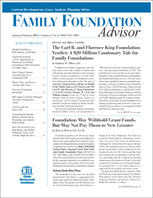Private Letter Rulings of Interest
Author: Staff Editors.
Source: Volume 12, Number 01, November/December 2012 , pp.6-8(3)

< previous article |next article > |return to table of contents
Abstract:
Although private letter rulings are not regarded as binding authority, they often do provide readers with insight into what new ideas might be worth considering for their own donors and clients. One recent ruling seems to offer a plan that could be disastrous for attorneys who seek to try out the charitable technique approved therein. The client left what seems to be the bulk of her estate to her attorney. This is a violation of legal ethics in virtually every state, unless the attorney was the client’s husband, son or daughter, or some other close relative. The Attorney General of the State, on behalf of the ultimate charitable beneficiaries of Client’s will, filed objections to the will and requested that the portions of the will appointing Attorney as executor and providing for a bequest to Attorney be stricken. The temporary administrator then filed an action seeking a return of the joint brokerage account and proceeds of the sale of the decedent’s residence. On this basis, the IRS concluded that the estate tax charitable deduction would be allowed to Client’s estate if four conditions were met. The service also recently released two substantially identical rulings demonstrating how the factors discussed above are applied in an actual contribution situation. In both rulings, the IRS concluded that the grants in question did not qualify as unusual grants.Keywords: PLR 201236022; PLR 201239011; PLR 201240036
Affiliations:
.